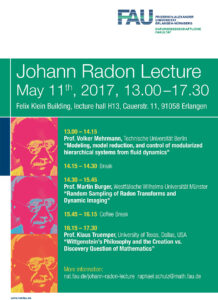Johann Radon Lecture
 Johann Radon Lecture 2017
Johann Radon Lecture 2017
May 11th, 2017
Felix Klein Building, lecture hall H13, 13.00 – 17.30
Cauerstr. 11, 91058 Erlangen, Germany
The Faculty of Sciences invites all interested people cordially to the Johann Radon Lecture at the University of Erlangen-Nürnberg, Germany.
Prof. Dr. Radon (1887 – 1956) was professor of Mathematics in Erlangen from 1925 – 1928.
Radon is known for a number of lasting contributions, e. g. the Radon transform in integral geometry, based on integration over hyperplanes with application to tomography for scanners.
Programme:
| 13.00 – 14.15 |
Prof. Volker MehrmannTechnische Universität Berlin Title: “Modeling, model reduction, and control of modularized hierarchical systems from fluid dynamics”We will discuss energy based hierarchical modeling using port-Hamiltonian systems in fluid dynamics. These models have many advantages: the mathematical model is close to the physics (by incorporating the available conservation laws), these conservation laws and the system properties like stability and passivity are directly encoded in the algebraic and geometric properties of the equations, such models can be modulary connected to bigger systems, and structure preserving model reduction and discretization is achievable. We present several real world examples from gas transport, electric power grids, the construction of new turbines, as well as acoustic field simulation. Then we discuss the (local) geometric and algebraic properties and the consequences for the analysis of the modelling and numerical errors, as well as the resulting pertubation theory. We finally demonstrate how to use the structure effectively in optimal control of PDE constrained systems. |
| 14.15 – 14.30 | Break |
| 14.30 – 15.45 |
Prof. Martin BurgerWestfälische Wilhelms-Universität Münster Title: “Random Sampling of Radon Transforms and Dynamic Imaging”
100 years after the seminal paper by Johann Radon the integral transform named after his development still plays a key role in medical imaging. Current development is focusing on dynamic imaging, which means that due to time constraints only incomplete measurements can be made at single time steps.
In this talk we will discuss two types of stochastic incomplete measurements: random angular sampling in computerized tomography (CT) and photon count processes in positron emisson tomography (PET). We will discuss the derivation and analysis of appropriate variational models for dynamic image reconstruction in presence of dynamics such as strong object motion. Based on those we demonstrate how the combination of random data with appropriate modelling can yield strong improvements in image reconstruction quality. |
| 15.45 – 16.15 | Coffee Break |
| 16.15 – 17.30
|
Prof. Klaus TruemperUniversity of Texas, Dallas, USA Title: “Wittgenstein’s Philosophy and the Creation vs. Discovery Question of Mathematics”
Over the span of tens of thousands of years, humans have created an elaborate body of theory unequaled in size and complexity: mathematics. There is a profound philosophical question: Where do all the results of this gigantic body of theory come from? Are they already present in some hidden, possibly metaphysical, location and then discovered by inquisitive minds, or are they created in the same way that engineers design various machines for energy conversion, production of goods, or transportation?
Over hundreds of years, this question has been answered in various, often diametrically opposed, ways. We examine this question using the approach of the philosopher Ludwig Wittgenstein for the resolution of philosophical problems. With the help of modern brain science, we also look into the strange aspect that eminent researchers arrived at and vigorously defended diametrically opposed answers. Indeed, that amazing process is ongoing today. The talk is based on the book “The Construction of Mathematics: The Human Mind’s Greatest Achievement.” It assumes no prior knowledge in mathematics or philosophy. |
Entrance free.
Raphael Schulz
91058 Erlangen
Felix Klein Building, lecture hall H13, 13.00 – 17.30
Cauerstr. 11, 91058 Erlangen, Germany
This content was integrated by fau.karte.de in the form of a frame. To access the map directly, follow the link below: https://karte.fau.de/api/v1/iframe/term/felix-klein-geb%C3%A4ude/center/49.57371,11.03043/zoom/18
Prof. Dr. Jürgen Schatz
Universitätsstr. 40
91054 Erlangen
- Phone number: +49913185-23037
- Email: nat-dekan@fau.de
- Website: https://www.nat.fau.de/fakultaet/dekanat/